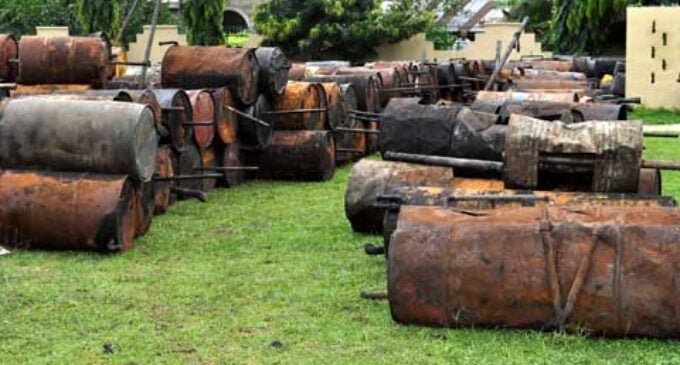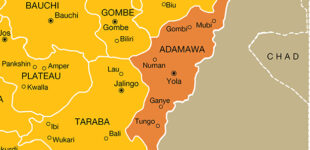Legalise indigenous crude oil refining

Am I the only one miffed by the manner in which the Nigerian Air Force, NAF recently exhibited its ‘prowess’ as evidenced by its targeted strikes of indigenous oil refineries in the Niger delta?
In demonstration of NAF’s new found machismo, in the past few days,the news about the force’s latest ‘conquest’ made headlines all over the news media, as if they just captured the Boko haram terrorist group that has kept the long suffering Chibok girls in captivity in excess of 900 days and still counting.
The ‘feat’ of precision strikes on the indigenous oil refineries in the Niger delta,which are more or less like seating docks was celebrated with so much gusto that one could have thought that the NAF had finally located, targeted and obliterated the dreaded Niger Delta Avengers, whose threat to cripple crude oil exports from the Niger delta unless their grievances are addresses is being carried out with aplomb.
Without accomplishing the much desired task of rounding up the captors of the Chibok girls in the dreaded sambisa forest in north east Nigeria, which could have given Nigerians, especially family members of the victims greater sense of relief , or actualizing the mission of flushing out those that govt is accusing of wreaking havoc on critical oil assets in the creeks of the Niger delta , l was galled by the huffing and puffing of the NAF, which l’m told has just recently been retooled with new fighter jets and helicopter gunships to fight terrorists.
Instead of ‘smoking out’ Boko haram from their hiding places as they have always boasted,NAF seem to be relishing turning their weapons against the soft targets of indigenous oil refineries, which are critical investment assets and major sources of employment for Niger delta artisans.
The obvious offense of the owners of those indigenous oil refineries , which are the local equivalent of Western designed modular refineries being ‘zapped’ by NAF with their new ‘toys’, in my opinion, is that they are trying to eke out a living in a trade which the authorities in abuja are yet to approve.
Without a doubt, each time those refineries are blown up, govt ‘earns’ more enemies amongst the creek dwellers.
This is because in the absence of rivers to practice their traditional fishing activities due to pollution in the rivers and therefore no fish to catch; and without farms to cultivate crops because the land has also become too polluted and barren , they have been rendered jobless.
Since they have no other option, they have to resort to operating indigenous oil refineries as means of sustenance.
Think about it:
The only alternative to fishing or farming, which is now impossible to practice owing to the damage to the waters and ecology, is piracy which is anti social and not a better option than illegal refining of crude oil- which is obviously obtained illegally since they are not officially allocated.
Simply put, the trade or vocations that is indigenous to Niger delta people have been made extinct due to the ruinous practice of oil and gas exploration in Africa by International Oil Companies, lOCs.
If some of the reckless oil exploration practices engaged in by the IOCs that are damaging the environment and polluting the waters in Nigeria were to be practiced elsewhere in the Western world, the oil company would be slammed with hefty fines that would compel it to improve on its exploration methods, as is the case with BP, which is yet to recover from the financial fine imposed on it by US authorities after oil rig explosion in the Gulf of Mexico, that leaked enormous amounts of crude oil into the coasts that hindered fishing,farming and other vocations.
It is against the foregoing backdrop that l pose the following question which l consider apt:
Does president Muhammadu Buhari, Commander-In-Chief of The Armed Forces of the Federal Republic of Nigeria and members of his cabinet that have the purview over the Niger delta, realize that destruction of indigenous oil refineries,which is a major provider of means of livelihood for the people in the region, may be fueling the militancy in the zone?
That may not be obvious, but any keen observer of activities in the Niger Delta which is the treasure trove of Nigeria would notice that each time the refineries are blown up, they seem to re-appear somewhere else, almost immediately because they render essential services and support families. This happens despite the capital investments lost in the assets that had been blown up.
At this juncture, it is important to state categorically that l’m not a Niger delta apologist, but a peace maker with the best intention of contributing to national growth and development through crisis management, conflict resolution and peace building.
This is in furtherance of president Buhari’s policy of getting Nigerians inside and outside of govt to think out-of-the-box to find solutions to nagging national issues, a call which he recently put in practice when he had a brain storming session on the economy with successful billionaires including Aliko Dangote, the richest man in africa.
Having said that,l can glean three critical points from the strange pattern of behavior and resilience of investors in, and operators/owners of indigenous oil refineries, despite various governments attempts to wipe them out over the years:
(1) The operators of the refineries are ready to stake all that they have to sustain the illegal trade perhaps because they don’t have any alternative means of livelihood since fishing and farming indigenous to them can’t be practiced as a result of oil exploration
(2) Market for their products exists which is why they continue to resurface somewhere else shortly after their facilities are attacked and they seem to have enough capital to start off somewhere else with ease probably because the trade is lucrative.
(3) Assuming that the indigenous refiners have been illegally siphoning the crude oil refined in their rickety facilities, granting them legal access to crude oil by allocation, would mean that they won’t have to steal it anymore, since nobody steals what can be obtained legitimately.
That being the case, the threat of crude oil theft would be reduced, if not eliminated, when a part of the 450,000 barrels reserved daily for local refining by the dilapidated NNPC refineries , but currently being exchanged in the nebulous crude-oil -for-refined-products-swap, is allocated to indigenous refiners.
Best of all, the initiative would create jobs in the Niger delta as opposed to the swap arrangement with Western oil companies-Total, Eni,Varo and Cepsa-which now exports jobs that should have available to jobless Nigerian youths to the countries in Europe where the crude is being refined.
Against the foregoing backdrop , if indigenous refineries are providing jobs for the indigenes of the Niger delta and there is market for the products of the refineries , and their activities are creating economies and boosting the GDP of the area,mr president, legalize it, don’t criminalize it.
In a country where profiteering is the norm rather than exception, who knows who might be profiting from the blowing up the refineries and what about the ecological damages done to the environment by the crude oil products pouring into the environment, when refineries are blown up?
Has mr president ever considered the fact that at the heart of the resource control struggle in the Niger delta, is the feeling and sense of non ownership of their God given resources by indigenes?
And considering that indigenes are not allowed by law to participate in the oil trade via indigenous refining, the resentment may be consolidating the sense of alienation or separation from the natural resources in the earth crust beneath their ancestral home.
Mr president consider the hypothetical scenario and rhetoric questions below:
How would the Fulanis feel if all the cattle in the north were to be gathered into a ranch or ranches in Kano, Sokoto and Abuja as well as Warri and all the cattle rearers are forbidden from practicing the trade anywhere in the north?
Would the the cattle rearers who know no other way of life not be incensed and go up in arms? Trying to change the attitude and life style of the average fulani herdsman-who is naturally itinerant-to grazing cattle in a confined ranch environment, has proved to be a Herculean task over the years, how much more stopping them from even cattle rearing at all.
The uproar that denying the average Fulani from practicing cattle rearing may trigger a revolt that maybe worse than the historical uprising led by the legendary Queen Amina of Zaria in northern Nigeria.
A similar comparison can be made in the south-west of Nigeria in which indigenous Yoruba people engage in cocoa famine.
Assuming cocoa farming which is the traditional practice in the Yoruba land was confined to only govt owned and managed farms/plantations and processing mills with ordinary folks ‘agbekoyas’ engaged in cocoa business, being prohibited from farming or processing?
Would the ‘agbekoyas’ not go up in arms to the extent that the ancient kiriji wars in which the yorubas armed with Dane guns repelled Fulani invaders, may be a joke, in comparison?
Pardon the porn, if you will,but l’m only trying to bring some nostalgia into a very simple matter that got complicated through sheer insensitivity by the other ethnic groups in Nigeria to the plight of Niger delta indigenes.
Believe it or not, the situation in the Niger delta whereby indigenes have been striped of their traditional means of livelihood is a major part of the reason that the region has been aflame.
To get to a solution, Govt needs to interrogate the origin of the prohibition of indigenous oil refineries. Some say major oil companies, lOCs which wanted to dominate the market, advised govt not to allow small scale indigenous participants, much the same way they capped small/ marginal oil wells over a long period until they were recently offloaded to marginal oil/gas players like Dubri, Muni-Pulo,Consolidated, Midwestern, Aiteo, Seplat, Seven Energy etc.
If that is the case, why did govt allow itself to be tele-guided by the IOCs and how come the policy has not been repealed same way that marginal oil fields hitherto capped,have now been spun-off to marginal players?
In the highly acclaimed negotiating book, GETTING TO YES: Negotiating Agreements Without Giving In, authored by Roger Fisher and William Ury and revised by Bruce Patton of Harvard Negotiation Project, a group that deals with all levels of negotiation and conflict resolution, a successful negotiator must keep the following in mind as objectives:
(A)Disentangle the people from the problem.
(B) Focus on interests, not positions
(C) Work together to find creative and fair options.
(D) Negotiate successfully with anybody at any level.
Bearing the above negotiation template in mind, let’s try to address the seeming intractable conflict situation in the Niger delta, which is the treasure trove of Nigeria and therefore deserve extra ordinary attention.
Now, indigenous people have always been innovative albeit in rudimentary ways and they may have poor attitude to adoption of technology, but before the advent of Western technology, life existed.
Amazingly, it is easy to forget that what was dubbed illicit gin by Westerners but known as ogogoro or KaiKai by indigenous people, was brewed in the same Niger delta region from palm wine obtained from raffia palm,which grows widely in that region. Although, the locally brewed gin in the Niger delta, was banned during colonial rule, it never stopped existing in the alcoholic beverage menu of the members of the lower rung of society who found it more affordable than the aromatic schnapps etc packaged and sold after being flavored by corporate distillers in the cities like lagos.
After being put through a system of fermentation over a period of time, the local gin which is unflavored is produced and shipped to lagos via rafts that sail through the creaks of Delta, Edo and Ondo states to get to lagos, which is the main market and platform for further distribution down the channels.
Keen observers would notice the booming trade in local gin or ogogoro from the Niger delta between traders in lagos and the Ijaw distillers who arrive the Akpongbon end of Marina every morning via their log rafts.
Although their equipment is crude like that of gin makers , all that indigenous oil refineries really do is cook the crude oil before passing it through all sorts of rudimentary filtrations.
Obviously, the process is inefficient and the end products are below standard, so what in my view should be done instead of blowing up the indigenous refining facilities, is for govt to get involved in the processes with a view to helping the indigenous people improve on the local rudimentary technology for better quality of output and thus create an economy in the Niger delta which is currently lacking.
For crying out loud,most of today’s cutting edge technologies were crude yesterday.
Think about the airplane when it was first introduced by the Wright brothers -Orville and Wilbur viz-a-viz what it is today.
Think about made in Taiwan and Korea products two decades ago?
Back in the days, products from those countries were derided, but today, Kia, Daewoo,Hyundai, Samsung, LG and other hi-tech products like Acer computers and HTC phones are from those countries that used to be sneered at.
I have proposed this remedy before but relevant top govt officials in the out-gone regime who were personally benefiting from the largesse accruing from the crude oil-for-refined petroleum products swap, ignored it, and l’m proposing it again.
For a long lasting solution to the socioeconomic instability in the Niger delta , Govt needs to set up a cooperative society to coordinate the legitimization of indigenous crude oil refining in the region.
Operating under the aegis of a corporative society , modular refineries can be acquired and leased to the members of the cooperatives in the various kingdoms, clans or precincts.
At the peak of the militancy , it was estimated that about a million barrels of crude oil was being lost daily. At $50 per barrel, a million barrel could have fetched Nigeria $50m daily.
Correct me if l’m wrong, but I think it was Vice President Yemi Osinbajo that said something to the effect that Nigeria is loosing about $100m daily to vandalism stemming from militanc.
If a fraction of that amount is invested in acquiring modular refineries for the engagement of Niger delta indigenes in processing crude oil into petroleum products , then a major part of the crisis in the Niger delta would have been quelled.
Again,there is nothing novel about the funding initiatives that’s being proposed because govt has been setting up several intervention funds through the Central Bank of Nigeria, CBN and Bank of Industry, BOI for the textile, cocoa, agriculture, aviation and automotive sectors of the economy, so why not extend similar gestures to Niger delta artisans-who are indigenes of the treasure trove of the nation- and the goose that lays the golden eggs?
In life, there is no law or rule that is immutable because law/rule is made for man and not the other way round.
If the law/rule outlawing indigenous refineries has become obsolete, why not get it repealed?
In my considered opinion, the issue of indigenous refineries in the Niger delta is comparable to the challenge of bootlegging-illegal importation of alcohol into the US -when it was prohibited by Congress after overriding then president Woodrow Wilson’s veto of the prohibition Act in 1920. The prohibition was in operation until 1933 when Franklin D Roosevelt, FDR unbanned it through the ratification of the 21st amendment which repealed the 18th amendment on December 5, 1933 as part of the raft of legislations passed by FDR as counterpoise to the Great Depression as encapsulated in his pact with America tagged the NEW DEAL.
During the period of ban, the crime of bootlegging became very serious as it was particularly attractive to the Mafia-nickname for an organized mob group-who made stupendous wealth smuggling alcohol into the US at a premium price even though it was banned.
After authorities had dissipated so much energy and time trying to eradicate the trade without success, much the same way that the Govt in Nigeria has been trying in vain to wipe out indigenous oil refineries, FDR with the anticipated calamity of Americans becoming alcoholics and the much sought after grains during the depression being wasted in brewing alcohol, as those who enacted the law had feared.
Similarly, marijuana-addictive weed that has medicinal value but may cause hallucination- which had hitherto been banned in the entire US has been unbanned in a couple of states without the grave consequences of citizens becoming addicted to the drug, as it was also feared by the promoters of the law,hence the prohibition.
Although, marijuana has been unbanned in some states , it is under semi control because only people under medical prescription as opposed to all and sundry are permitted to use the substance which is still classified as drug and it is also being farmed under license.
Since the lifting of the prohibition, the economies in the states of Colorado and California that have legalized marijuana, have received boosts from the farming and sales of the product valued in billions of dollars.
According to New York Times report of October 1, 2016 written by Azam Ahmed, and titled “Jamaica Once Opposed to Marijuana, Now Wants to Cash in On It”, decriminalization of marijuana in the US has encouraged Jamaica to do same and export of marijuana may soon become part of Jamaica’s main exports- sports and music to the world.
Notice that the decriminalization of the two referenced products- alcohol and marijuana- in the US boosted the economies of the states concerned and created employment for the catchment areas as well as led to less expense and effort in the enforcement of the law/rule by the legal authorities.
Similar benefits awaits the good indigenes of the Niger delta and Govt of Nigeria, if indigenous refining of crude oil is systematically decriminalized.
I went into all the details above simply to justify to skeptics that there is no law that is sacrosanct in life. If a law becomes retrogressive, it recommends itself for repeal.
Given the etymology of the prohibition rule-l refer to it as a such since l can’t seem to find any relevant law in the statue books barring indigenes from harvesting and processing cash crops or products endemic to them – the order against indigenous refining of petroleum products is illegible for review and repeal.
I have discussed the viability of this option thoroughly in a previous article titled “A Case For Niger Delta Indigenous Refineries” published in Vanguard newspaper of October 29, 2012 and other mainstream and online media platforms.
No matter how well packaged and perfectly intentioned a rule /law is, there comes a time when it becomes retrogressive, hence the US constitution undergoes amendments from time to time.
The rule/law on indigenous refineries is one of the sort that needs to be reviewed.
In conclusion,it seems to me that the fear of producing and selling substandard or adulterated fuel to unsuspecting members of the public by indigenous refineries operators, which seems to be the only viable justification hinged on the principle of protection of members of the public, can be cured by replacing the indigenous refineries with Western made modular refineries.
And this can be done by organizing current operators who have no access to the size of funds required to acquire modular refineries, into cooperatives for the ease of licensing, monitoring and providing funding for the project by govt.
Obviously, Niger delta indigenes whose traditional means of livelihood-fishing and farming- have been rendered redundant due to exploration of oil/gas in the zone, deserve another means of livelihood in order to eke out a living like every other Nigerian.
The only alternative to a decent and legitimate engagement for survival, would be piracy which is worse than indigenous refining of crude oil.
So l urge the govt of president Muhamadu Buhari which is increasingly proving to be a listening Govt by virtue of the fact that it has now reduced bombastic talks about Nigerians being fantastically corrupt, instead of speaking proudly about the great exploits of Nigerians in the diaspora, such as Hillary Clinton’s personal physician Oladotun Okunola; it has also stepped up espousing concrete plans on how the economy would be pulled out of recession and demonstrating prudence by putting up for sale,two jets out of ten in the presidential fleet, thereby giving Nigerians hope as opposed to despair through the preachment of doom and gloom ,which was the govt’s main penchant in the first one year of being in the saddle.
Hopefully, unlike the immediate past regime whose top officials were more interested in their selfish interest of lining their pockets, hence the idea of allocating part of the 450,000 barrels of crude oil set aside for local refining to indigenous refiners in the Niger delta after their refining process might have been improved upon, as l have as l have been advocating . The current leadership of the petroleum ministry, with mr president doubling as substantive minister, along with Ibe Kachikwu as minster of state and Baru Makanti as NNPC group managing director, should take the bull by the horn with a view to resolving the logjam in the Niger delta through critical thinking as opposed to planned resort to the barrels of the gun, if recent reports in the media that additional 3000 troops have been deployed to the region is correct.
While the principle of first displaying a show of force before engaging in a negotiation is understandable, going all the way out to crush agitators with military power, would prove to be as woeful as the Sanni Abacha and Olusegun Obasanjo approach in the past which ended up worsening the crisis in the Niger delta. The evidence of the ruinous past is the fact that the current Govt in collaboration with the United Nations, UN are now trying to clean up the mess left behind by the military misadventure of both old soldiers,at colossal financial costs.
Nigeria needs oil money to survive the current challenge of tanking of commodity prices worldwide.
Applying brute force to extract the oil from a resistant indigenous population, to me is tantamount to attempting to kill a tsetse fly perched on a man’s scrotum by smashing the fly and scrotum with ferocious force.
The blood sucking insect, would certainly die and the scrotum along with the owner too, would certainly perish in the process, which would be a dumb thing to do.
Clearly, the business of governance is not to wipe off the people that are supposed to be led to prosperity and higher standard of living, which is basically why govt exists.
Therein lies the dilemma. Shoot or don’t shoot.
The choice is left to ex military general, Muhammadu Buhari, president and Commander-In-Chief of the armed forces of Nigeria , to shoot or maintain the peace in the Niger delta.
Its a zero sum game.
As a soldier and in a military govt, the choices might have been easy for mr president,but as a reborn democrat and politician, l doubt if it would be a walk in the park. So we watch.
Onyibe, a development strategist and futurologist is a former commissioner in Delta state Govt and alumnus of Fletcher School of Law and Diplomacy, Massachusetts, USA.
Views expressed by contributors are strictly personal and not of TheCable.














There are no comments at the moment, do you want to add one?
Write a comment